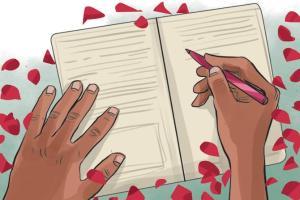Two young Indian men, training to fight wars, listening to ghazals, on Radio Pakistan.

Illustration. Uday Mohite
![]() As an Air Force cadet posted near the border, my father had a roommate nicknamed Chuha Pathak who loved rum. A lot. Every evening he would make himself a peg too big for Patiala and wait for the sun to set. As soon it disappeared from the horizon, so did the rum from his glass and he got himself and my dad another. Then they would sit.
As an Air Force cadet posted near the border, my father had a roommate nicknamed Chuha Pathak who loved rum. A lot. Every evening he would make himself a peg too big for Patiala and wait for the sun to set. As soon it disappeared from the horizon, so did the rum from his glass and he got himself and my dad another. Then they would sit.
Two young Indian men, training to fight wars, listening to ghazals, on Radio Pakistan. Begum Akhtar, Malika Pukhraj, Farida Khanum but most beloved, Iqbal Bano singing Tu lakh chale ri gori, and her renditions of Faiz Ahmad Faiz's poetry, from Dasht-e-tanhai to Hum dekhenge.
ADVERTISEMENT
They would have been puzzled by the assertion of Mr Vashimant Sharma and IIT Kanpur for setting up a committee to gauge if this rather famous revolutionary poem is anti-Hindu.
I guess Mr Sharma would be perplexed by these poetry loving fellows too, with such flexible ideas of loves and enemies. Poetry is a problem. A really big one if you are obsessed with borders, divisions and categories. Because poetry exists to embody how we can be different without being divided.
A friend told me how she hated poetry in school until one teacher took her under her wing. "She just opened the poems up and it changed the way I thought. It allows you to find endlessly different meanings. And yet, all meanings are valid, without cancelling each other."
Poems are the world's biggest and best flirts, never spelling out their meaning, but encouraging you to make one. To take a poem literally is to miss the meaning of poetry altogether. As with flirtation, bring too much agenda to it and poetry becomes joyless, engage insincerely and it begins to wilt. A poem must be approached with an open mind and a free spirit.
"To understand poetry you must feel it first" tweeted the director Vishal Bhardwaj. If you are scared of freedom, that is scary business. If you are open to a poem's suggestions, to entering your feelings, you might have to give up the certitudes you hide behind. You might want to change your plans or the world. You might set yourself free. You might fall in love! So much more control in focusing on the words, not the meanings. Hate and suspicion can be effective ways of avoiding your own mixed feelings. Or, as a T-shirt I saw, today said, "Love is An Art But I Am A Science Student."
Well, let's not blame Mr Sharma and IIT-K whose students command such good dowries. Poetry hasn't had a good run lately. Liberal dadiwalas have been insisting that realism is automatically superior and progressive for so long. Since progressive realism was the currency, it led to a reactive counter-realism, in the form of fake news.
But perhaps the reason we know something is changing, a cycle is breaking, is because of poetry—not only the poetry flowing effortlessly in multiple languages at protests around us right now, but the poetry young people write and publish online, or recite at open mics. In the turning world, Poetry is pushing forward to suggest other ways are possible, we needn't be oppressed by old orthodoxies —our ideas and spirits can be free and science students can also get As in the arts subject of love.
Paromita Vohra is an award-winning Mumbai-based filmmaker, writer and curator working with fiction and non-fiction. Reach her at paromita.vohra@mid-day.com
Catch up on all the latest Mumbai news, crime news, current affairs, and also a complete guide on Mumbai from food to things to do and events across the city here. Also download the new mid-day Android and iOS apps to get latest updates
 Subscribe today by clicking the link and stay updated with the latest news!" Click here!
Subscribe today by clicking the link and stay updated with the latest news!" Click here!







